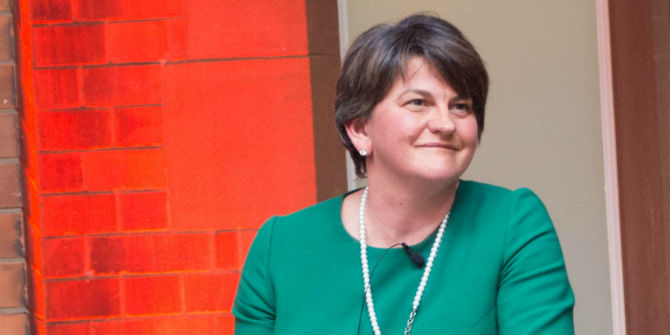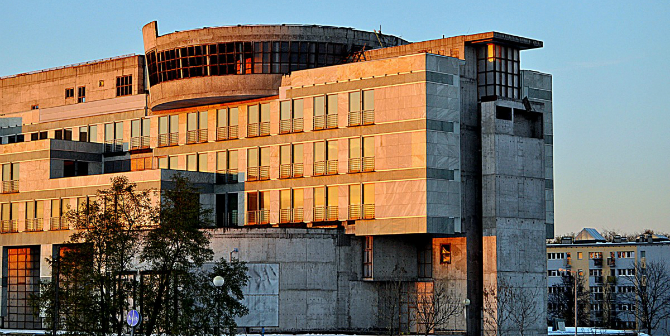 The path being pursued by the DUP in Brexit, says Jonathan Evershed (University College Cork), is not so far from the mainstream of Unionist opinion.
The path being pursued by the DUP in Brexit, says Jonathan Evershed (University College Cork), is not so far from the mainstream of Unionist opinion.
Theresa May’s pact with the DUP has seen constitutional principle overtaken by electoral contingency and political expediency. On 26th June 2017, the spirit and, some have argued, even the letter of the Good Friday Agreement were undone by the Prime Minister with the stroke of a pen and not a moment’s hesitation. And it has brought the Northern Irish margin into the political centre in a manner not seen since IRA bombs in England focused minds on finding a resolution to the dirty little war across the Irish Sea, the history and legacies of which a majority on the ‘mainland’ remain comfortably ignorant. Neither the Union’s constitutional architecture nor its political culture are designed to accommodate this centripetal motion, and there is speculation that the Prime Minister may yet seek to stab her DUP allies in back to service the needs of an English nationalism which has little real understanding of (and even littler regard for) the hopes, fears and idiosyncrasies of its provincial fellow travellers.

The DUP’s torpedoing of the first draft of the Joint Agreement between the UK government and EU27 in December has therefore been described as both the peak and inevitable limit of their power. Some have suggested that after this flexing of the party’s muscles, the way has been cleared to the softer Brexit (at least for Northern Ireland) which its more ‘sensible’ members recognise as inevitable. It is alleged that there are some – whose business-friendly heads rule their historically Eurosceptic hearts – who may even prefer this option. In my experience (and I am not alone in claiming this) however, the suggested divergence in thinking on Brexit between two wings of the party – one softer and with its locus in Belfast; the other more hard-line and with its powerbase in Westminster – is not as stark or significant as those hoping for a soft Brexit might wish. Unlike within Theresa May’s own party there is, it seems, a remarkable unanimity of opinion on Brexit within the DUP, which sees it not as representing a divergence between economic self-interest and the demands of identity, but of a marriage between them.
While members of the party are aware that it is only a highly unlikely parliamentary arithmetic that allows them to wield a veto over any attempt to create a ‘special status’ for Northern Ireland after Brexit (other, of course, than on marriage equality, bodily autonomy for people who are or can be pregnant, corporation tax and the myriad other areas in which Northern Ireland diverges from the rest of the UK on the DUP’s terms) there is an overwhelming sense that, caught between Corbyn and her own back-benches, an embattled Theresa May continues to need the DUP more than the DUP need her. The party’s base has been buoyed by the £1bn of extra funding secured for Northern Ireland by hard-nosed DUP negotiators and a sense that Brexit (for which, it should be remembered, an overwhelming majority of them voted) is not – as I have become used to thinking of it – a risk, but an opportunity. At the very least, former DUP Minister Nelson McCausland’s pronouncement that he “wouldn’t care” what happened to Northern Ireland’s economy, society or its border with the Republic as long as it happens outside of the EU, is widely shared.
And in this, the DUP is, I think, more than broadly representative of wider Unionist opinion in Northern Ireland. While the third of Unionists who voted Remain, and this interesting poll conducted by Queen’s University Belfast’s John Garry and John Coakley (whose finding that a majority of Unionists would be open to a new East-West border arrangement between Northern Ireland and Great Britain after Brexit I find to be increasingly questionable) have provided some succour to those whose preferred outcome is as soft a Brexit in Northern Ireland and as invisible an Irish border as possible, I see little evidence of divergence within wider Unionism from the position adopted by the DUP, including among the minority of Unionists who voted Remain. Despite claims that the party favours a softer Brexit, the DUP’s is a relatively hard-line position. If the UK is to remain in the customs union (which, as an aside, is not sufficient to secure a soft border on the island of Ireland), it will not be at the behest of the DUP. And if it comes to a choice between the hardest of hard borders on the island of Ireland and even modest (further) regulatory divergence across the Irish Sea, I believe Unionists will overwhelmingly support the DUP in insisting on the former.
The Tory-DUP deal has reinforced what Brexit already was in Northern Ireland: a restatement of British sovereignty in and over the province, and a repudiation of the Good Friday Agreement’s experiments in fuzzy borders and hybrid citizenship. In bringing the war beneath Northern Ireland’s peace from the periphery into the constitutional centre, Theresa May has subjected the peace agreement and its institutions – already largely disliked by Unionists and facing mounting challenges to their endurability – to a full-frontal assault which they may not survive, and galvanised – in a way which will be difficult if not impossible to undo – a politics which sees a hard Brexit as synonymous with defending the integrity of the Union and Northern Ireland’s place within it. Whether or not she eventually tries to close it again, the Prime Minister has opened a Pandora’s box, unleashing, like her predecessor in Number 10, demons of which she knew not.
This post represents the views of the author and not those of the Brexit blog, nor the LSE. It first appeared at the Centre on Constitutional Change blog.
Jonathan Evershed is a Postdoctoral Research Fellow in the Department of Government and Politics, University College Cork, where his work on the ESRC-funded project ‘Brexit between Two Unions’ explores the consequences of Brexit for political relationships within and between Northern Ireland, Ireland and Great Britain. He has a background in political anthropology, and completed his PhD at the Institute of Irish Studies, Queen’s University Belfast, where he is currently a Visiting Research Fellow. His research has examined the politics and culture of Ulster Loyalism during the present ‘Decade of Centenaries.







Yes indeed May is caught between what is effectively a very uncomfortable reality and the siege mentality of the unionists,many of whom would starve in order to see a hard border and Derry cut off from Donegal by whatever means. It is their visceral identity, basically the settler defending what he has against the encroaching native…that was the raison d’etre for NI in the first place. BUT the deep blue sea is the problem. If that deep blue sea involves the UK crashing out without any transition to a legal and regulatory limbo as a third country, effectively Myanmar then it is looking at a national emergency with planes grounded and production lines collapsing…all because of a Red Channel at Larne and Belfast? In that case the deep blue sea will win and the unionists will be under the bus…as nothing, not even the unionists will trump factories in Norfolk and food supplies to Sheffield.
I agree with the previous comment that the DUP should be very suspicious of their so-called “partners” in the Conservative Party.
The modern Tory Party has no particular attachment to Imperial sentiment, unlike the Tory Party of generations ago. Have the DUP forgotten how it was Margaret Thatcher who brought in the hated Anglo-Irish agreement in 1985? Have they forgotten how the Tory’s erstwhile allies the Liberal Democrats were shafted in the 2015 general election?
There is no Imperial sentiment in the Tories’ current alliance with the DUP. They will be betrayed at the first opportunity. “Better to be England’s enemy than England’s friend.”
It’s hard to entirely blame Theresa May for her deal with the DUP, since she had no other options. But the decision has added to the damage already done by Brexit to the fragile political stability of Northern Ireland. Restoring the NI executive now seems next to impossible until Brexit is over. With the NI executive down for so long, the DUP and Sinn Fein inevitably move towards the sectarian extremes. However Brexit turns out, the British parliament will have an extremely difficult task in restoring political stability to Northern Ireland. That will need good will from the Irish government, with British-Irish relations currently at their lowest point in probably three decades. It doesn’t matter if there’s a land border or a sea border or neither, the long suffering people of Northern Ireland will be losers from Brexit, they’re just waiting to find out how much they’ve lost.
Actually it is easy to blame Theresa May for her deal with the DUP. The election was fought as a public backing for her brexit policy, her red lines, her hard line approach. She failed to get that mandate, but she didn’t soften her approach as she should have, she looked to the only brexit supporting faction in Northern Ireland for support. This was divisive not just for NI but also the UK as a whole.
The electoral mandate she asked for was rejected and she should have made exiting the EU a cross party project, but she doubled down on her hard brexit fantasies. She is personally to be blamed for the mess we are in over the Irish border (and the rest).
Important corollaries and even correctives to some of the arguments I made in this piece from Newton Emerson in the Irish Times today https://www.irishtimes.com/opinion/dup-faces-heavy-responsibility-for-brexit-position-taken-lightly-1.3489256. Seems that leaving the customs union may not be the red line for the DUP I thought it was, with potentially significant consequences.
I seem to recall that it was Charles Russell a solicitor from Belfast and later Attorney General and then Lord Chief Justice of England who opined that it would be the Conservative Party that one day would give Ireland Home Rule. Of course that did not happen, but from what is said in the blog it would not be any surprise if by default or misjudgement the current dilemmas over Brexit brought about not just the secession of the UK from the EU but the secession of NI from the UK.